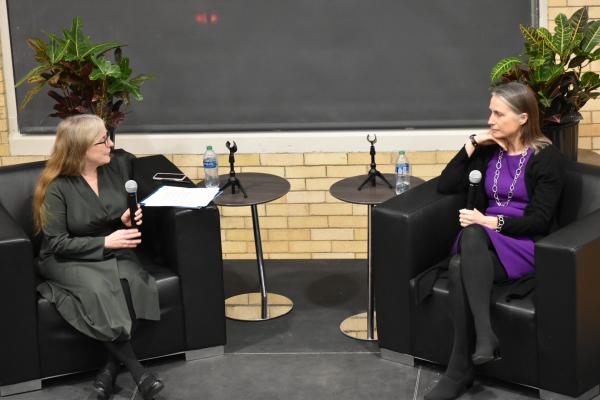Fiona Hill visits Mershon for Kruzel Lecture; conversations about her career and Russia

Russia expert Fiona Hill visited the Mershon Center this past Thursday as the 2022 Joseph J. Kruzel Lecture speaker.
After an introduction from Ohio State Provost Melissa Gilliam, Hill discussed the Russian context and impact of Vladimir Putin’s invasion of Ukraine with Mershon Director Dorothy Noyes.
During the conversation, she spoke of Vladimir Putin's adaptability, allowing him to remain the central figure in his country's political arena since the 1990s. She warned about tying too much of a nation's identity and decision-making to just one person.
"What do you get out of too much fealty to one guy?" Hill asked the audience. "You get a horrific war, the largest military conflict in Europe since World War II. You get essentially a world war. All because one guy made a decision based on his own misconceptions."
In addition to meetings with graduate students and faculty, Hill joined Andreas Dorpalen Professor of History Geoffrey Parker for a small-group conversation at the Mershon Center. Parker, who mentored Hill during her undergraduate years at St Andrews University, invited her to reflect on her personal history as a first-generation college student from County Durham - the coal country of northern England.
Hill emphasized the synergy between personal networks and institutional opportunities and the interdependence of community well-being and individual mobility. She described the powerful impact of study abroad at vital historical moments, including a Soviet Union stay in 1987 during the crucial Reagan-Gorbachev summit, and she explained how her early experience of de-industrialization and class prejudice in the UK enabled her to understand the human impacts of post-Soviet economic collapse in Russia and structural racism in the US.
Both conversations highlighted lived experience and academic history as counterbalances to nationalist mythology. In October, before abandoning the city of Kherson, Putin’s army robbed the tomb of Grigory Potemkin, Catherine the Great’s lover and legendary propagandist, to take his remains back to Russia. Why bother? Hill asked. “You can’t build the future of a country out of old bones.”
